- Home
- Lynne Truss
Cat Out of Hell Page 3
Cat Out of Hell Read online
Page 3
“The Captain loathed all the killing, he said – and even from the point of view of the poor little street-cat on the receiving end, I believed him. But I grew quickly to understand, as he did, that there was no other way of finding out whether I was The One. If you’ll excuse the pun, this was the ultimate process of elimination. After cutting my throat and then leaving me to die in the pit, he went on to hang me, drown me, brain me –
There is a little whimper from Wiggy here.
“Gas me, burn me, and poison me – each time having to prepare himself for an even greater likelihood that I would not return. When I recovered from the final test, I found him bent over me, weeping. He thought I hadn’t made it.
“He thought you were dead?”
“Exactly.”
“Wow.”
There is a pause.
“But you weren’t dead?”
“No.”
“Wow.”
“Wiggy, look, I’ll explain it again.”
“Would you? Cheers.”
“He had killed me eight times.”
“Yes.”
“I survived each time.”
“OK.”
“Meaning that I’m the cat that literally has had nine lives.”
“Right. Like every cat has nine lives, kind of thing?”
“Except that most cats nowadays die once and that’s it.”
“Got it. Got it. I think I’ve got it.”
Roger waits. Wiggy makes a “Huh!” noise of exhalation.
“I’m a very special cat, Wiggy,” says Roger. “That’s the bottom line here.”
“Well, I know that. You can talk.”
Roger sighs. “Yes, I can talk,” he says, flatly. This is clearly as far as he’s ever going to get, explaining things to Wiggy. He goes back to the story.
“I wish I could remember everything he told me. The trouble is, once someone has shown you a convincingly different way of looking at the world, it’s hard to remember how you saw it before. If it helps (but I suspect it might not in your case, Wiggy), the Captain was a classic Nietzschean. According to his world view, he and I were both Uberkatzen, and it’s true that once you are an Uberkatze, the feebly simple one-bang-and-you’re-out mortality of others – especially of the weakling human – is impossible not to be impatient with. In the process of finding a companion for himself, the Captain had sacrificed literally hundreds of cats, over the course of forty years. Scores and scores of them had not survived the initial slashing; a mere dozen or so had raised his hopes temporarily by coming out of the pit. But not a single one before me had got even as far as life number five! All this killing had made the Captain sad and weary and disgusted, he said – but it was the sense of perpetual let-down that had injured his spirit the most.
“ ‘With every cat I had hope,’ he explained. ‘I thought, perhaps this one will have what it takes! But they died. One after another, they died. And in the end, their pathetic weakness made me sick. Can you imagine it, Roger? Losing all compassion? Feeling only fury and dismay?’
“I felt that I could. But I said, carefully, ‘I don’t know.’
“ ‘Think of little Bill,’ he said. ‘I know you loved him. His death was senseless. But be honest. Having survived as you have done, over and over, eight deaths that were each of them far worse than his, what do you really think of him now?’
“I thought of Bill’s little broken body. Of the kitten who had been so sweet and beloved. Of my sense of loss; the shock of his sudden departure from this world. And then I said, with perfect candour, ‘You’re right. Little Bill? What a pussy!’ ”
There is a pause. Wiggy (thankfully) says nothing. And then Roger laughs. It is a shriek of a laugh, that raises all the hairs on the back of my neck each time I play it. “Your face!” he says. And then he laughs and laughs, and then, abruptly, the recording comes to an end.
JPEG DSC00021
This picture, in black and white, shows a man standing in a patch of bluebells in dappled light. He has a handsome face. Big ears. He holds a lit cigarette. Beside his leg sits a cat – the same cat as in the first picture, the one I assume is Roger. Roger is pressing his head against the man’s calf in what looks like an affectionate way. I wonder if the man is Michael, the one who died in Lincolnshire and bequeathed Roger to Wiggy’s sister Jo? No, it can’t be. It’s from much longer ago. The trousers of the man are post-war; he looks a bit familiar. The quality of the picture is fuzzy, as if it had been printed on soft paper.
JPEG DSC00768
Again, black and white. Again, the picture quality suggests a fairly ancient date. 1960s? Two cats together: one is the supposed Roger cat, the other a massive black tom with a handsome head. The black cat is lying down, stretched out on a patch of long grass in sunshine; the Roger cat lies on his back, his legs in the air, his head resting on the black cat’s abdomen. They are both relaxed. If they were young men instead of cats, you would assume they had been for a drink and a swim after their final examinations, and that there was an ancient teddy bear called Aloysius lying half-hidden in the grass. Behind them, little is in focus – a tree is casting shade across the bottom left-hand corner of the picture. Still, you can make out bushes, trees, and an Elizabethan chimney.
I looked at this picture several times before noticing, right in the foreground at the top of the picture, a hazy horizontal shape. It makes no sense – being presumably some distance off the ground, and too close to make out properly. I narrow my eyes, searching for detail. It looks like a pair of brogue shoes, heels together, toes pointed out.
ROGER NOTES
(by Wiggy)
Roger has been tearing stories out of the papers! I left the Telegraph on the kitchen table last Thursday, and then went out in the garden. When I came back in, there were holes in it, not to mention really deep scratch-marks in the table-top. I suppose it’s my own fault for cutting out the crossword for him every day. It started a precedent. But I thought it was pretty reasonable when he first made the suggestion. After all, it’s true what he said: I don’t do cryptics. I don’t have the right kind of brain.
Of course, he’s giving me the silent treatment still. Not a single coherent word for a week. The bastard. All miaowing. Miaow, miaow, miaow. God, it sounds so sarcastic when it comes from him. It’s like it’s in inverted commas. What sort of cat is he, anyway? He never dealt with that scratching noise, did he? In the end, it just stopped. Anyway, back with the cuttings, the big Silent Act meant it was pointless asking him what these stories were that he was so bloody interested in. He’s done it again every day since, as well, as if he’s looking for something in particular. So today I had one of my Wiggy Brainwaves. I secretly bought two copies of the paper from the village shop – and hid the second in the fridge. Which might sound a bit odd, so I should explain it’s not me; it’s Roger. The thing is, Roger, for all his mental brilliance, hasn’t been able to work out a way to open the fridge! I’ve started keeping my wallet in there, just to be on the safe side. I put Jo’s phone in there too (still in the bag), after I realised Roger had been playing with it in the garden, and had nearly lost it under a bush. I really must take that phone to a phone shop soon and see what can be done.
Anyway, back with my cunning plan, I left the first Telegraph on the table as usual, and went out for half an hour for a pensive smoke beside the sea. Then I came back in, to find the paper on the table in the usual tatters, and quickly took both papers into the downstairs loo. It took a while to work out exactly what had gone, but in the end, it turned out he had torn out three stories. Which were:
1) A light-hearted news item about the statistics concerning various bizarre fatal domestic accidents last year in the UK (caused by tea-pots, dressing-gowns, place-mats, trousers).
2) A story about an East End gangster who had apparently taken his own life by jumping off the roof of a car park near the 2012 Olympic Stadium.
3) The obituary of some obscure academic from Cambridge.
No idea w
hat to make of any of this, and as I said, I can’t even ask at the moment. Miaow, miaow; miaow, miaow, miaow. He really is a bastard, Roger. He won’t tell me what has happened to Jo – or he has to tell me his whole so-called life story first, which will take several bloody years at the rate he’s going. And then he clams up for a week and just does cryptic crosswords in his head, making contented purring noises to let me know how clever he’s being. Sorry to get worked up, but how the hell do you talk to a cat like Roger? Whichever approach you take, you feel like a total idiot. On the one hand, you can’t say normal cat things like, “Ooh, what’s for your dinner tonight? Is it a bit of lovely fishy-wishy?” He’s the feline equivalent of Stephen Fry, for God’s sake! On the other hand, what if someone came in and I was saying to the cat, “Oh, Roger, I forgot to say. I bought you that copy of Shaw’s Man and Superman you asked for. Where would you like me to put it?”
If Roger never spoke again, would I mind? It’s a toss-up. It’s certainly a lot more peaceful round here when he’s in “proper cat” (or what I call PC) mode. But when he’s not talking, I feel I’m making no progress, and might as well be dead. I don’t know what to do with myself. I did have a look through Jo’s binoculars yesterday, and saw hardly any birds at all, so what a waste of time. Puzzling, though. Whatever Jo was watching for, she saw it virtually every day – in fact, this is quite interesting, on the day she called me, she made a note of seeing it at about 3:30 in the afternoon – which would be just before she called me at the theatre! The handwriting is quite shaky, so she must have been excited. Also, thinking about it, wouldn’t it have been almost dark by then? Well, that means it can’t be birds! To be honest, this makes me even more keen on the aliens theory. Maybe that’s what she kept seeing … a flying saucer! Maybe she just had time to pick up the J-Dog and “Whoosh!” – up they both went, off across the dramatic coastline of Littlehampton and beyond to the Isle of Wight. (Although she did have time to call me first, which slightly ruins that scenario.)
Talking of scenarios, I had another go at a bit of proper writing at the weekend, but it’s hard to get a grip on it somehow. Ever since Roger suggested Daniel Craig to play him “in the film,” I can’t help picturing him dressed in a shiny designer suit, running along the top of a train as it goes round really tight corners coming out of Istanbul. He’s got quite an idea of himself, hasn’t he? I play along with that Nine Lives story of his, but I don’t care about any of this stuff – why should I? He could be making the whole thing up. And meanwhile, I learn nothing about what’s happened to Jo – nothing. That policeman came back today and asked whether I’d had the mobile looked at yet. I think he was quite surprised when I got it out of the fridge to give it to him, but he didn’t say.
ROGER SCREENPLAY 2
(by Wiggy)
A cottage by the sea. Peaceful. WIGGY strolls into kitchen, lights cigarette, fills kettle, casually opens fridge. BOND-TYPE ACTION MUSIC as ROGER explodes out of fridge, lands on WIGGY’s shoulder, and delivers a devastating range of blows on WIGGY, who drops to his knees.
WIGGY
(yells)
No! Roger!
More blows. NB: ROGER makes no cliché squalling cat-fight noises. He is silent, focused, methodical, assassin-like. (This makes it more scary.) WIGGY’s arterial blood spurts and pours onto kitchen floor.
WIGGY
(naturalistically)
But how did you open the – ?
I thought you didn’t know how to open the – !
Get off!
A final coup-de-grace swipe to the throat. WIGGY keels over, dead. ROGER jumps down on to the floor. He stops, raises a paw and admires his bloodied claws with a secret smile. He looks back at the lifeless body of WIGGY and the fridge door swinging open.
ROGER
(with classless, masculine understatement, over the shoulder)
Nice, Smeg.
AUDIO TWO
The second recording has a different ambient sound. As we discover, Wiggy and Roger are in a borrowed flat near to Russell Square in London. Cars and lorries pass outside. The pavements are evidently very busy, too: young people in groups can be heard. Dogs bark. Sirens pass. It’s a winter afternoon. As will become apparent, Roger has persuaded Wiggy to take him on a trip down memory lane, and they have gone together to London.
“Ready?” says Wiggy. He sounds a bit tired and tetchy. Perhaps it’s been a long day. “Might we get as far as Jo today, Roger? Where did we leave your life story last time? Around 1928? How fast can you do the next eighty-some years?”
There is a pause. Wiggy tries another tack.
“Had it changed a lot?” Wiggy asks. “I could tell you were shocked when it turned out they’d built the Olympic Velodrome directly on the site of the Captain’s special place.”
Again, Roger doesn’t speak.
“Do you miss the Captain?”
Roger laughs. “No,” he says. He laughs again. And I apologise for saying this, but anyone else but Wiggy would realise that this is an intriguing answer, and would follow it up. Wiggy, frustratingly, does not.
“Why did we have to see that car park?”
“Just a theory.”
Wiggy thinks for a moment. He is evidently making a connection to the car park suicide from the papers! Each time I listen to this recording, I pray again: Don’t mention the cuttings from the newspaper, Wiggy. Knowing the contents of those three stories torn out by Roger from the Telegraph is your single advantage, right now.
You will be pleased to hear that, for once, he makes an intelligent decision.
“Will you live for ever, Roger?” he asks.
“That was what I asked the Captain,” says Roger. “When my ordeal was over, all those years ago.”
There is something quite mechanical in the way Roger picks up the tale where he left off. It makes you wonder: how many times has he told it before? What is his purpose in telling it to someone like Wiggy?
“Does this mean I will live for ever? The very question I asked the Captain. Does this mean I can never be killed again?”
He’s off again. “After all, would anyone choose to have eternal life? One needn’t read very deeply in the great myths and stories of the world to know the general verdict on eternal life – immortality is always discovered to be far more of a burden than a blessing. Living for ever deprives the spirit of hope and purpose. It also separates you from mortals in mainly tragic ways. Think of the Sibyl at Cumae – or, if you like, Wiggy, given your more limited range of cultural reference, think of Doctor Who. Of course, I didn’t think like this in those far-off days of my youth. I hadn’t read anything. I didn’t know anything. I was a rough-edged street cat familiar with just a couple of square miles of East London. But I knew enough to be afraid of what the Captain had done to me. After all, as a Nine Lifer himself, he was clearly not a happy cat. He did not rejoice in his own immortality, if that was what he had. It was clear that the only thing that gave him happiness was me. He was wonderfully proud of me. He had created a companion for himself. For the first week or so, all he wanted to do was congratulate me, marvel at me, tell me the story of my triumphant nine lives again and again and again.
“We moved from the warehouse after a week or so. Why should the East End contain us? For the next ten years, in fact, we travelled. In the first instance, it was easy enough to get to the docks at Tilbury, to hop aboard a ship and leave London far behind. We both adored the idea of life at sea, and we had all the requisite skills for stowing away on board. When you think about it, any ordinary cat is good at making himself invisible, scavenging, defending his territory – and we were not remotely a pair of ordinary cats! I recall that we always encountered trouble at first from the pre-existing cat population, but the Captain was more than a match for them. On the first ship, which was bound for Cape Town, we were no sooner out of the Thames Estuary than we were cornered in the engine room by four big heavy cats. In my mind’s eye, these cats had tattoos and heavy accents, but I’ve always been
a big reader, so my imagination might be embellishing things a little. Anyway, I remember how I took several deep breaths, readying myself for a fight with these tough mariner felines. But the moment I started to yowl and spit, the Captain struck me in the chest to silence me, and hissed, “I’ll take care of this.”
“What happened next was simply amazing to watch, and requires no embellishment whatsoever. Soundlessly, he walked towards the four big cats, and sat down in the middle of their circle. They were confused (as was I!), but at the same time couldn’t believe their luck. The Captain looked at the biggest of the four – the cat looked back. And then something phenomenal happened. The other cat started to edge backwards, and he also shook – as if he had lost control of every muscle – and I’m not lying, for a moment or so, he sort-of lifted off the ground. The Captain looked into the eyes of the next cat, which immediately edged back as well. I had my paws over my eyes – he was going to slash all their throats, wasn’t he? He would kill them the way he had killed all those others! But he wasn’t interested in killing them, it seemed. He just overwhelmed them, vanquished them, terrorised them, and they retreated, and we never saw them again – because (as I later realised) they threw themselves overboard. In my innocence, I thought they hid from us for the remainder of the voyage. I would sometimes remark to the Captain that we hadn’t seen them since the encounter in the engine room, and he would say, “You’re right!” – as if he couldn’t explain it either.

 Get Her Off the Pitch! How Sport Took Over My Life
Get Her Off the Pitch! How Sport Took Over My Life Going Loco
Going Loco Talk to the Hand
Talk to the Hand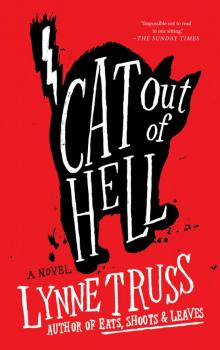 Cat Out of Hell
Cat Out of Hell Eats, Shoots and Leaves
Eats, Shoots and Leaves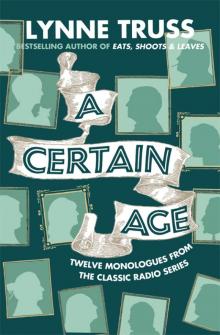 A Certain Age: Twelve Monologues From the Classic Radio Series
A Certain Age: Twelve Monologues From the Classic Radio Series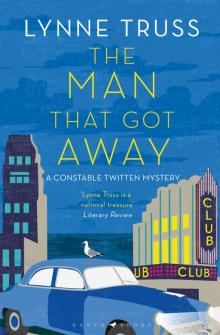 The Man That Got Away
The Man That Got Away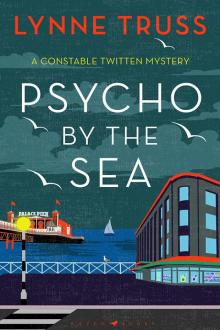 Psycho by the Sea
Psycho by the Sea With One Lousy Free Packet of Seed
With One Lousy Free Packet of Seed Tennyson's Gift: Stories From the Lynne Truss Omnibus, Book 2
Tennyson's Gift: Stories From the Lynne Truss Omnibus, Book 2 Get Her Off the Pitch!
Get Her Off the Pitch! Tennyson's Gift
Tennyson's Gift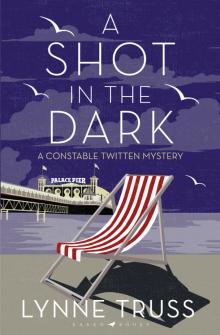 A Shot in the Dark
A Shot in the Dark Eats, Shoots and Leaves: The Zero Tolerance Approach to Punctuation
Eats, Shoots and Leaves: The Zero Tolerance Approach to Punctuation